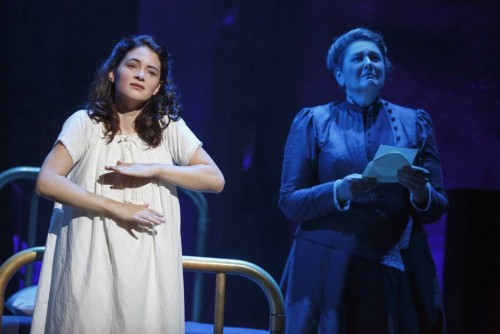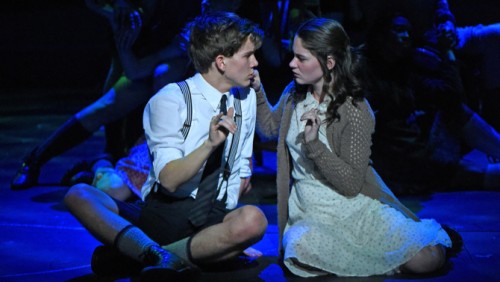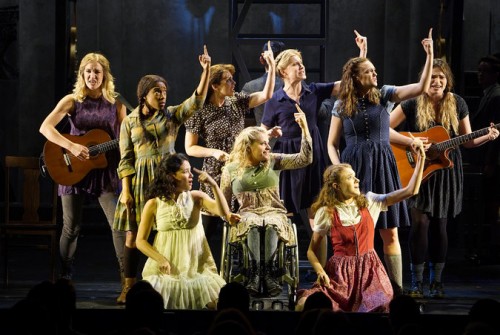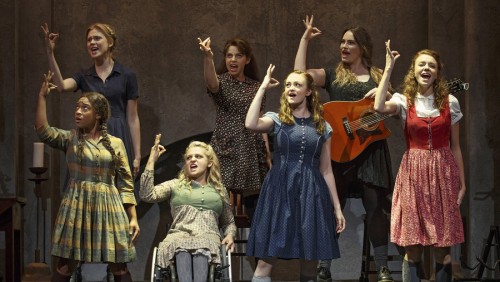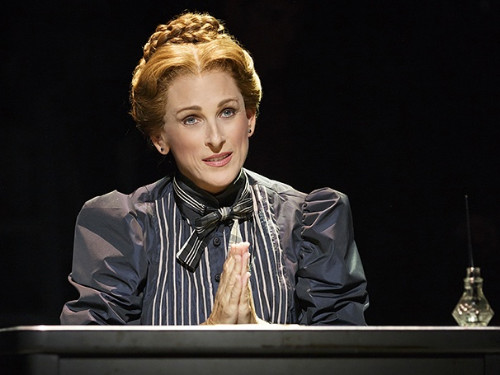Spring Awakening Revived on Broadway
The Sound of Silence
By: Charles Giuliano - Nov 23, 2015
Spring Awakening
Book and lyrics by Steven Sater; Music by Duncan Sheik; Choreography by Spencer Liff; Directed by Michael Arden
Cast With Robert Ariza, Miles Barbee, Katie Boeck, Alex Boniello, Joshua Castille, Lizzy Cuesta, Daniel N. Durant, Treshelle Edmond, Sandra Mae Frank, Kathryn Gallagher, Sean Grandillo, Elizabeth Greene, Russell Harvard, Amelia Hensley, Van Hughes, Lauren Luiz, Camryn Manheim, Daniel Marmion, Marlee Matlin, Austin McKenzie, Andy Mientus, Patrick Page, Ren, Krysta Rodriguez, Daniel David Stewart, Ali Stroker, Alexandra Winter and Alex Wyse
There are currently two productions in New York by the controversial playwright Benjamin Franklin Wedekind (July 24, 1864 – March 9, 1918). The Metropolitan Opera has mounted a new version of Alban Berg's Lulu (1937) which was based on plays by Wedekind. It features designs by the South African artist William Kentridge.
The musical Spring Awakening was adapted by Steven Sater from his controversial play Frühlings Erwachen (1891). It focuses on a heady melange of lustmord, homoeroticism, individual and group masturbation, sadism, abortion and suicide. It is being revived by Deaf West Theater on Broadway. The musical closed in New York in 2009.
Historically the confrontational works of Wedekind and his assault on bourgeois values, particularly sexual inhibitions, was a part of the development of expressionism in theatre and an influence on the Epic Theatre of Brecht.
His Swiss mother conceived in San Francisco but he was raised in his German father’s castle in Switzerland. Sexually he was rapacious, frequented prostitutes and became infected with syphilis. He struggled with inclinations toward homosexuality and sadism. These are themes that inform his theatrical works. He served a nine-month prison term for the publication of erotic poems in the avant-garde publication Simpliccimus.
Set in 1890s Germany Spring Awakening is both brutal in theme and content as well as poetically beautiful with a superb score by Duncan Sheik. There have been numerous regional productions of the period piece which continues to feel fresh, edgy and contemporary.
The events focus on school children, their oppressive Teutonic teachers who enforce corporal punishment, and parents unwilling to address the needs of confused adolescents.
In the classroom we see students learning by rote while reciting Latin texts. In addition to spoken word and signing, at times, the text is projected on a blackboard in the classroom. The roles of teacher and minister are harsh and interchangeable. The playwright drew upon repressive social norms, depicts them vividly, and attacks with vengeful impunity.
It is the unique production by Deaf West Theater that brings the musical so quickly back to Broadway. There is an intriguing combination of hearing and hearing impaired actors. Everyone on stage uses American Sign Language. While deaf actors perform in key roles their ‘voices’ are conveyed by actors that shadow them. Often we found ourselves searching the stage to identify where the sound was coming from.
Prior to attending the matinee we spoke with Marlee Matlin at an ATCA sponsored lunch at Sardi’s. This represents the first Broadway appearance by the Oscar winning actress. She started with theatre when she was just seven. She is returning to the stage for the first time since the launch of her career in film thirty years ago. She plays supporting roles as Frau Gabor, Frau Bessell and Frau Schmidt.
I asked her if the show is being well attended by hearing impaired individuals? It was fascinating to look about during intermission and see many members of the audience signing to each other. It is intriguing that they are attending a musical which they cannot hear. Clearly the work resonates with this audience on many other levels.
The show is greatly enhanced by its unique staging. The signing proved to be so expressive that it conveyed richer emotional understanding of the dark and poignant subject matter.
The play has been embraced by young audiences who identify with the growth and emotional challenges of their peers on stage. The themes which resonate today were strictly verboten when Wedekind boldly introduced them.
The virgin Wendla Bergmann, played by the deaf Sandra Mae Frank, asks her mother how babies are made.
The answer is self conscious and confusing. Camryn Manheim as the mother tells her that for a woman to bear a child she “must … in her own personal way, she must … love her husband. As only she can love him.”
While that is essentially true the misinformation from her mother leads to dire consequences. She is attracted to Melchior (Austin P. McKenzie). Their love making starts with affection and quickly escalates to violence. She asked for him to beat her with a switch but that gets out of control with him ranting “bitch” while raping her.
Of course she becomes pregnant and is forced into an abortion.
Suffice it say without being a spoiler that by the end of the play three of the youngsters are dead including a suicide.
Much of the angst of the adolescents stems from the brutality inflicted in the classroom. There is no tolerance for learning disabilities which are met with ridicule and physical punishment.
This is strong stuff for a Broadway musical particularly considering that the play originated at the end of the 19th century.
There is much to learn from this play and production. This confluence of deaf and hearing actors makes it all the more compelling and intriguing. There was also an interesting contrast between the young cast and their elders who ranged from abuse to ineffectual compassion.
Emerging from the theater there was much to absorb and think about.


